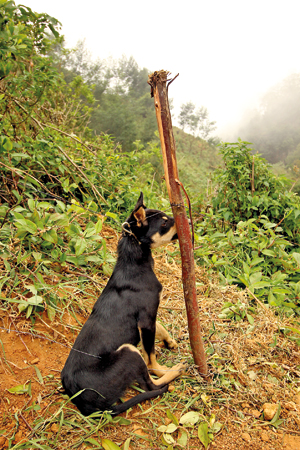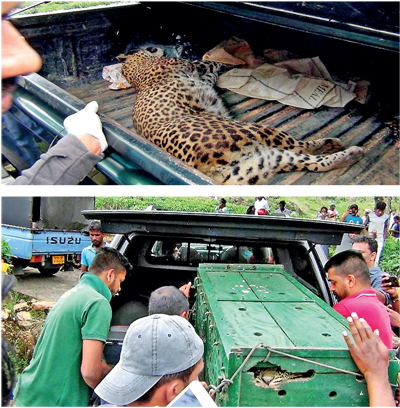News
Dogs tied with wire to lure leopards to snare: Suspect arrested
 The man who cruelly tied up a dog as bait to attract leopards to snares set up on an estate in Uduweriya area near Horton Plains was arrested this week, a senior wildlife official said.
The man who cruelly tied up a dog as bait to attract leopards to snares set up on an estate in Uduweriya area near Horton Plains was arrested this week, a senior wildlife official said.
Jinapriya Gallage, a resident of Nuwara Eliya who was hiking near the area on Tuesday, spotted the tethered dog on a private property bordering Horton Plains.
He took photographs of the dog, which had been tightly tethered to a pole with wire. The dog had been bound at the neck and body, restricting its movements.
Mr. Gallage posted the photos on social media, where they came to the attention of wildlife officers.
He told the Sunday Times he had seen the dog while trekking to the “Yakage Padipela area”. He had not wanted to trespass onto private property in order to free the animal.

The suspect's small hut on the property
“I cannot tread onto private property. It would also not be easy as the property is in a steep location in a secluded area. I was only able to take the photo by using a zoom lens,” he said.
“As I am experienced as a wildlife photographer, I suspected that the dog was used as bait for a leopard. As there were more cases of reports of leopards getting entangled in snares I took a photograph and posted it on social media.”
A senior wildlife officer who requested anonymity explained that estate workers were terrified of leopards and do not hesitate to kill them. He said using dogs as bait to trap leopards in snares was a common practice.

The other dog that faced the same fate after being freed by wildlife officials
The official also said there was a popular belief that parts of leopards such as teeth, claws, skin and oil extracted from the animal are effective in “mantara and gurukam” (voodoo), which were popular these days among politicians contesting elections.
Although this practice is based on myth, the animals were being targeted, he said.
The official said there were more than six killings of leopards reported this year, including the death of the rare black leopard found in a snare on May 26. He pointed out that most of the deaths took place in the hill country and most leopards were killed in snares.
Following the discovery of Mr. Gallage’s photographs, a team of nine wildlife officers including the Park Warden of Horton Plains, Pradeep Kumara, visited the area.

Photographs of the dog, which had been tightly tethered to a pole with wire were posted on social media by Jinapriya Gallage. When wildlife officials arrived the dog had been freed (top left)
Mr. Kumara said the team contacted Jinapriya Gallage and asked him to give directions to enable a raid on the property in question at 6.30am on Wednesday.
The private property, which appeared to have been abandoned by the owner, was being used by a labourer to grow crops.
“When we visited the area the dog that was seen in the photograph was not on the scene. Instead, there was another dog set in its place,” Mr. Kumara said.
“On further inspection, we found snares fixed near the dog.”
The labourer claimed the dog was tied up to scare monkeys and that the snares had been placed to kill wild boar.
“As wildlife officials,” Mr. Kumara said, “we know leopards prey helpless animals and that what was being done would invite leopards into the property.
“We found the other dog, which was found tied up.
“We warned the owner of the property to remove the snares. We said that if snares were found on his property we would take legal action against him. Then we ordered the worker to appear before Welimada courts next Tuesday.”
Amid public concern about the leopards recently found trapped and killed or dying in snares, wildlife officers have been searching hill-country estates, removing about 70 snares from one estate and continuing to remove snares from other properties.
The Director-General of Wildlife Conservation (DWC), Chandana Sooriyabandara said a new office would be set up in the hill country to protect leopards living near estates. Officials are studying data to establish the office at a suitable site.

Two leopards entangled in snares were found at Pudukadi area in Helboda estate in Kotmale on Tuesday. Wildlife officials said one was dead while the other was seriously injured when they arrived on the scene.The injured leopard was taken to Nuwara Eliya Wildlife office for treatment. Pix by Shantha Chandrasiri
Mr. Sooriyabandara also said estate residents had been given the wildlife hotline 1992 to report leopards found in snares or to report trouble with leopards.
“The DWC is developing a mobile phone app for direct communication between residents and wildlife officers in the area. The app will be available soon,” he added.
He stressed the Sri Lankan leopard (Pantherea pardus kotiya) was endemic to the country and a protected species and therefore should be strictly protected.
He said there was no evidence that the black leopard had been killed using bait. He believed the animal had died of injuries sustained while struggling in the snare. The postmortem report on the leopard was pending. “The report will be directly sent to the courts,” Mr. Sooriyabandara added.
| Animal cruelty reports spur police into action | |
| A spate of incidents of animal cruelty including suspected poisoning of dogs was reported this week. In Aluthwewa, Gallewela, 10 dogs were found dead this week. The Officer-in-Charge of Gallewela police, Chief Inspector Rukshantha Perera, said officers have recorded statements from 10 residents in the area and requested a veterinary surgeon to carry out postmortems of the dogs to determine if the animals had been poisoned. Police said the villagers had said a poultry farmer in the area had poisoned the dogs. “We informed the Environmental Police. Accordingly, police and an official of the Central Environmental Authority inspected the farm. Police also recorded a statement from the owner of the farm.” The dogs’ owners are adamant their pets had been poisoned. One, Kumari Ekanayake, said that although only one of her four dogs was found dead, simultaneously the dogs of their neighbours had died. “One of my dogs, who was named Kolla, was found dead near my mother’s house. My daughter said that the dog had vomited blood and died. I don’t think the dog had died due to an accident because it didn’t have any injuries,” she said. Later, she learned that two dogs in her brother’s house had also died. “Afterwards I learned that around10 dogs in our area have died in a similar way,” Ms. Ekanayake said. “I have suspicions that the owner of a poultry farm poisoned the dogs.” Meanwhile, Rathtota Police said they and the forestry department had carried out an operation to apprehend a gang that was capturing birds such as parrots and hill mynahs from the wild to sell as pets. The birds live in hollowed trees near estates bordering the Knuckles Ranges. Three suspects from the Akurana area were arrested and produced in court, police said. The President of the Animal Welfare Protection Association, Hemantha Jayatilaka, said activists who had helped draft the bill were disappointed that it had not been implemented but was still before parliament. She urged police to take stern action against animal cruelty. |

